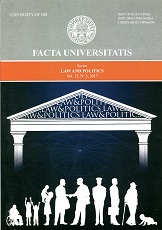A New Function of Prison Industry and Private Prisons in Developed Countries, and the Possibility of their Implementation in the Republic of Serbia
A New Function of Prison Industry and Private Prisons in Developed Countries, and the Possibility of their Implementation in the Republic of Serbia
Author(s): Emil TurkovićSubject(s): Labor relations, Penology
Published by: Универзитет у Нишу
Keywords: prisoners’ labor; unproductive prisons; prisoners’ welfare; competitive workforce
Summary/Abstract: In the 1990s, various countries had a different approach to the problems related to prisoners’ labor. In the United States, the concept of prison labor could survive only in such developed states as New York, Pennsylvania and Massachusetts which could cope with the burden of keeping unproductive prisons. Under the impact of the penal reform and upon the adoption of new penal legislation in these states, the old American tradition of labor prisons gave way to a new standard which implied that convicted offenders had to learn different crafts while in prison but they were excluded from the public labor market when at large. The new industrial program, which was thus engendered, has significantly contributed to spreading the reformist functions of prison labor. Organized prison labor had always been strongly supported by penal reformers in the north of the United States but, in the mid-1980s, as the penal reformers moved away from that part of the United States, the concept of organized prison labor no longer had a significant political and legislative impact. The influence of penal reformers and the idea of instituting convict labor (but without competition in the labor market) had a strong influence on government politicians both at the federal and state government levels. The reformers endeavored to ensure the prisoners’ welfare and enable all prisoners to work and participate in the labor market as competitive workforce, both by leasing their labor and through the sale of final products on the free market.
Journal: FACTA UNIVERSITATIS - Law and Politics
- Issue Year: 15/2017
- Issue No: 4
- Page Range: 347-360
- Page Count: 14
- Language: English

